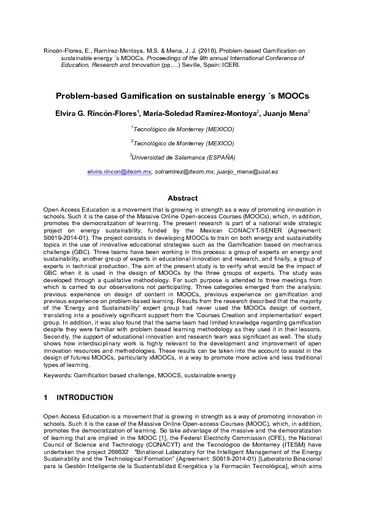| dc.contributor.author | Rincón Flores, Elvira G. | en |
| dc.contributor.author | Ramírez Montoya, María S. | en |
| dc.contributor.author | Mena Marcos, Juan J. | en |
| dc.date.accessioned | 2016-10-08T22:13:29Z | |
| dc.date.available | 2016-10-08T22:13:29Z | |
| dc.date.issued | 2016 | |
| dc.identifier.uri | http://hdl.handle.net/11285/620899 | |
| dc.description.abstract | Open Access Education is a movement that is growing in strength as a way of promoting innovation in schools. Such it is the case of the Massive Online Open-access Courses (MOOCs), which, in addition, promotes the democratization of learning. The present research is part of a national wide strategic project on energy sustainability, funded by the Mexican CONACYT-SENER (Agreement: S0019-2014-01). The project consists in developing MOOCs to train on both energy and sustainability topics in the use of innovative educational strategies such as the Gamification based on mechanics challenge (GBC). Three teams have been working in this process: a group of experts on energy and sustainability, another group of experts in educational innovation and research, and finally, a group of experts in technical production. The aim of the present study is to verify what would be the impact of GBC when it is used in the design of MOOCs by the three groups of experts. The study was developed through a qualitative methodology. For such purpose is attended to three meetings from which is carried to our observations not participating. Three categories emerged from the analysis: previous experience on design of content in MOOCs, previous experience on gamification and previous experience on problem-based learning. Results from the research described that the majority of the 'Energy and Sustainability' expert group had never used the MOOCs design of content, translating into a positively significant support from the 'Courses Creation and implementation' expert group. In addition, it was also found that the same team had limited knowledge regarding gamification despite they were familiar with problem based learning methodology as they used it in their lessons. Secondly, the support of educational innovation and research team was significant as well. The study shows how interdisciplinary work is highly relevant to the development and improvement of open innovation resources and methodologies. These results can be taken into the account to assist in the design of futures MOOCs, particularly xMOOCs, in a way to promote more active and less traditional types of learning. | |
| dc.format | En Extenso / In Extenso | en |
| dc.language.iso | eng | en |
| dc.relation | 266632-CONACYT-SENER-S0019201401 | en |
| dc.relation.url | https://iated.org/iceri/ | en |
| dc.rights.uri | http://creativecommons.org/licenses/by-nc-nd/4.0/ | * |
| dc.title | Problem-based Gamification on sustainable energy ´s MOOCs | en |
| dc.type | Artículo de Conferencia / Conference Article | |
| dc.conference.name | 9th Annual International Conference of Education, Research and Innovation | en |
| dc.conference.host | International Academy of Technology, Education and Development (IATED) | en |
| dc.conference.location | Seville, Spain | en |
| dc.subject.keyword | Gamification based challenge | en |
| dc.subject.keyword | MOOCS | en |
| dc.subject.keyword | Sustainable energy | en |
| dc.identifier.volume | 2016 | en |
| dc.contributor.affiliation | Tecnologico de Monterrey | en |
| dc.subject.discipline | Ciencias Sociales / Social Sciences | |
| refterms.dateFOA | 2018-03-19T08:29:28Z | |
| html.description.abstract | <p style="text-align: justify;">Open Access Education is a movement that is growing in strength as a way of promoting innovation in schools. Such it is the case of the Massive Online Open-access Courses (MOOCs), which, in addition, promotes the democratization of learning. The present research is part of a national wide strategic project on energy sustainability, funded by the Mexican CONACYT-SENER (Agreement: S0019-2014-01). The project consists in developing MOOCs to train on both energy and sustainability topics in the use of innovative educational strategies such as the Gamification based on mechanics challenge (GBC). Three teams have been working in this process: a group of experts on energy and sustainability, another group of experts in educational innovation and research, and finally, a group of experts in technical production. The aim of the present study is to verify what would be the impact of GBC when it is used in the design of MOOCs by the three groups of experts. The study was developed through a qualitative methodology. For such purpose is attended to three meetings from which is carried to our observations not participating. Three categories emerged from the analysis: previous experience on design of content in MOOCs, previous experience on gamification and previous experience on problem-based learning. Results from the research described that the majority of the 'Energy and Sustainability' expert group had never used the MOOCs design of content, translating into a positively significant support from the 'Courses Creation and implementation' expert group. In addition, it was also found that the same team had limited knowledge regarding gamification despite they were familiar with problem based learning methodology as they used it in their lessons. Secondly, the support of educational innovation and research team was significant as well. The study shows how interdisciplinary work is highly relevant to the development and improvement of open innovation resources and methodologies. These results can be taken into the account to assist in the design of futures MOOCs, particularly xMOOCs, in a way to promote more active and less traditional types of learning.</p> | |

